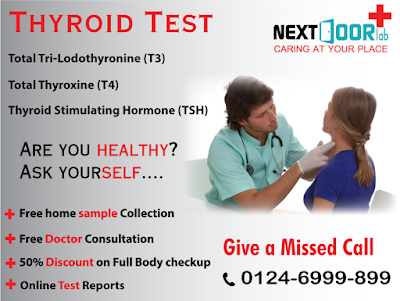Various thyroid function tests or TFTs are divided into two broad categories:
1. Thyroid blood tests
2. Non-blood thyroid tests
These categories are further subdivided into the following
1. Thyroid blood tests
a. TSH test
b. T3 test
c. T4 test
d. Thyroid antibody test
e. Thyroglobulin test
2. Non-blood thyroid tests
a. Imaging tests
i. Ultrasound
ii. Thyroid scan
b. Radioactive iodine uptake test
TSH tests
T4 tests
T3 tests
Thyroid antibody test
Thyroglobulin test
Radioactive iodine uptake (RAIU) test
Ultrasound
Thyroid scan
1. Thyroid blood tests
2. Non-blood thyroid tests
These categories are further subdivided into the following
1. Thyroid blood tests
a. TSH test
b. T3 test
c. T4 test
d. Thyroid antibody test
e. Thyroglobulin test
2. Non-blood thyroid tests
a. Imaging tests
i. Ultrasound
ii. Thyroid scan
b. Radioactive iodine uptake test
The above mentioned tests are done in order to detect thyroid disorders. The essential lab tests for thyroid function are explained below.
TSH tests
It is the primary thyroid blood test done for understanding your thyroid function. It is used to measure the levels of thyroid stimulating hormone (TSH). For this test, blood sample is required. The normal TSH value ranges from 0.2 to 4.7 µIU/ml, and any value within this range indicates that the person’s thyroid gland is functioning properly. A high TSH value means that the thyroid gland is not working effectively and leads to hypothyroidism. A low value of TSH on the other hand means that the thyroid gland is producing too much of hormones leading to hyperthyroidism.
T4 tests
T4 or thyroxine is one of the two hormones produced by the thyroid gland. It is present in the blood in two different forms: free T4 (FT4) and T4 bound to proteins. While FT4 can enter the target tissue/s and show its effects, T4 bound to proteins fails to enter the tissue/s that require the thyroid hormone. FT4 is measured to rule out that your thyroid function is proper and the thyroid blood test used for this is termed as Free T4 Index (FTI). The normal range of thyroxine is 0.8—1.8 ng/dl. Individuals with a higher FTI have hyperthyroidism, while those with suppressed or low levels of FTI have hypothyroidism.
T3 tests
T3 or tri-iodothyronine or free T3 (FT3) is performed to rule out hyperthyroidism and its severity. The normal range of total T3 is 60--200 ng/dl. Individuals with elevated FT3 values have an overactive thyroid. It is not used for hypothyroidism, but if does performed, the values are lower.
Thyroid antibody test
The immune system is a natural body’s defense mechanism. It protects you from foreign invaders: your immune system produces specific antibodies from lymphocytes that destroy the foreign invaders like viruses and bacteria. In some individuals, lymphocytes attack the person’s thyroid gland resulting in either over-stimulated gland or damaged gland. This is because of hypothyroidism or hyperthyroidism, respectively. The antibodies attacking the thyroid gland are thyroid peroxidase and thyroglobulin. Thus, thyroid antibody test is very important to measure the levels of these antibodies. This test helps in identifying the thyroid disorder’s cause. Positive test results for antithyroid peroxidase antibodies can cause an autoimmune disorder called Hashimoto’s Thyroiditis in patients with hypothyroidism.
Thyroglobulin test
In people who have undergone a surgery for thyroid cancer, thyroglobulin test is useful for them. Thyroglobulin is a protein or an antibody which is produced by cancerous thyroid cells and normal thyroid cells. Thus, this test is used to monitor the patient’s condition after the cancer treatment or surgery.
Radioactive iodine uptake (RAIU) test
The thyroid gland has to uptake lots of iodine from the blood for appropriate thyroid functioning. For this activity measurement, RAIU is useful. In this test, the radioactive iodine is given to the patient. The doctor tracks the iodine’s radioactivity in the patient’s body. This test then helps in evaluating the thyroid functioning. A high radioactive iodine uptake means that the patient has a hyperactive thyroid, while a low radioactive iodine uptake means hyperthyroidism or the patient’s thyroid gland is underactive.
Ultrasound
An ultrasound is an imaging test of the thyroid gland performed to view the size and structure of the gland along with the autoimmune inflammation pattern. This imaging test will also reveal if any nodule is present or tumor growth, which may be malignant.
Thyroid scan
Thyroid scan is a nuclear medicine imaging test. It is an integral part of the thyroid check-up. Small amounts of radioactive material are used in this test to create images of the thyroid gland. The patient is injected with radioactive material via vein. This helps in revealing the size, structure and position of the gland. This test can be used to find the cause of hyperthyroidism. this test also helps in finding out the presence of nodules. To detect the radioactive material in the patient’s body, a gamma camera is used which generates images on the screen. This test can clearly identify nodules that produce the thyroid hormones produced in excess. This test can detect Grave’s disease too.
Sometimes, no one test is sufficient to rule out problems with your thyroid functioning. Thus, your doctor may prescribe a few of these tests discussed above to detect and diagnose your condition. The medications and period of treatment varies from the patient to the thyroid functioning test results.
To know in detail about your thyroid condition, please contact us on 0214-6999-899. You can also visit our website: www.nextdoorlab.com, for other related information and ordering of tests.

No comments:
Post a Comment